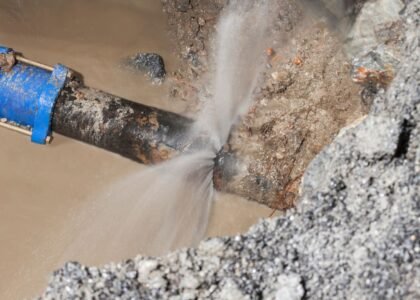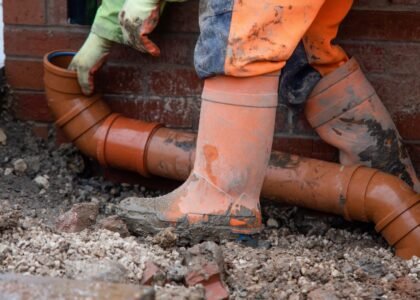Denver Pipe Repair Services – Expert Solutions for Every Plumbing Issue
Why Pipe Repair is Important Keeping your home’s pipes in good working order is very

Why Pipe Repair is Important Keeping your home’s pipes in good working order is very

When water pipes in a home or business begin to have problems, it can cause

Pipes are important parts of any building, carrying water in and out. When these pipes

Pipes are an essential part of any home or building, carrying water in and waste

When plumbing pipes in a home or commercial property start showing signs of trouble, quick
When unexpected plumbing disasters strike in your home or business, you need swift and effective action. Dealing with a burst pipe, a major leak, or a sewer backup demands immediate attention to prevent significant damage and disruption. Our team provides reliable Emergency Plumbing Denver services, ready to address your urgent needs with precision and care. We understand that plumbing emergencies do not keep regular hours, and our commitment is to be there when you need us most, offering practical solutions that restore comfort and safety to your property.
Plumbing systems are complex, and many issues can arise suddenly, requiring urgent professional help. Recognizing the signs of a true emergency helps you react quickly and minimize potential harm to your property. These situations often involve water damage, health risks, or structural integrity concerns.
A burst pipe is one of the most destructive plumbing emergencies. It happens when a pipe cracks or ruptures, releasing a large volume of water into your property very quickly. Cold weather can cause water inside pipes to freeze and expand, leading to bursts. Corrosion from aging pipes or excessive water pressure also contributes to this problem. When a pipe bursts, you often hear a sudden loud bang, followed by the sound of rushing water. Water begins to pool rapidly, damaging floors, walls, furniture, and electrical systems. Turning off the main water supply to your property is the first critical step you must take. Then, it is essential to contact professionals who can quickly locate the rupture, assess the damage, and perform the necessary repairs to stop the flow and prevent further destruction.
While a minor clog in a sink drain might be a nuisance, a severe clog can signify a much larger problem within your plumbing system. Main sewer line clogs are particularly problematic. These blockages prevent wastewater from draining away from your home or business, causing toilets to overflow, sinks to back up, and drains to gurgle loudly. The water that backs up is often contaminated, posing a health risk and creating unpleasant odors. Common culprits include tree roots invading pipes, flushed non-biodegradable items, or accumulated grease and hair. Resolving severe clogs requires specialized tools like hydro-jetting, which uses high-pressure water to clear blockages, or drain snakes designed for deep-seated obstructions. Ignoring these significant clogs can lead to burst pipes or extensive sewer line damage, escalating the problem and the cost of repair.
A malfunctioning water heater can quickly turn into an emergency, especially when it starts leaking or fails to provide hot water entirely. Leaks from a water heater tank can cause significant water damage to basements or utility closets. They often indicate a rusted tank, a faulty pressure relief valve, or loose connections. If your water heater produces no hot water, it might be due to a broken heating element, a faulty thermostat, or a pilot light issue in gas models. Beyond the inconvenience of cold water, a leaking water heater can contribute to mold growth and structural decay. Professionals can diagnose the specific problem, whether it requires a simple part replacement or a complete unit installation, ensuring your access to hot water is restored safely and efficiently.
Sewer line backups are among the most unpleasant and hazardous plumbing emergencies. They occur when the main sewer line, which carries all wastewater away from your property, becomes blocked or damaged. Signs include multiple drains backing up simultaneously, sewage odors emanating from drains, or gurgling sounds from toilets when other fixtures are used. The wastewater contains harmful bacteria and pathogens, making it a serious health risk. Tree root intrusion, collapsed pipes due to ground movement, or significant blockages from debris are common causes. Addressing a sewer line backup involves careful inspection, often with video cameras inserted into the lines, to identify the exact location and nature of the obstruction. Repair often requires excavation or trenchless methods to replace or repair the damaged sections, preventing further contamination and restoring proper drainage.
Gas leaks are perhaps the most dangerous plumbing emergency, as they pose an immediate threat of explosion or carbon monoxide poisoning. Natural gas has a distinct rotten egg smell added to it to help detect leaks, but sometimes leaks are subtle. If you smell gas, hear a hissing sound near a gas appliance or pipe, or notice dead plants near gas lines, you might have a gas leak. Your first action should be to evacuate everyone from the property, open windows if safe to do so, and immediately contact the gas company and emergency services from a safe distance. Do not operate light switches, appliances, or phones inside the building, as a spark could ignite the gas. Professionals use specialized detectors to pinpoint the leak’s source and perform precise repairs to seal the line, ensuring the gas supply is safe and secure before anyone re-enters the premises.
When a plumbing emergency occurs, every minute counts. The longer an issue like a leak or a backup goes unaddressed, the more severe the damage becomes. Water spreads quickly, soaking into floors, walls, and foundations, leading to extensive structural damage, mold growth, and costly repairs. For instance, a small leak from a pipe can, over time, saturate drywall, warp hardwood floors, and compromise the integrity of support beams. In the case of sewer backups, the health risks multiply with prolonged exposure to contaminated water. Immediate response helps to contain the problem, minimize property destruction, and reduce the overall cost of restoration. Acting fast also prevents secondary issues like electrical hazards from water-damaged outlets or appliances. Our team prioritizes rapid deployment to mitigate these risks effectively.
Our process for handling plumbing emergencies is systematic and designed for maximum efficiency and effectiveness. We understand the stress these situations cause, and our goal is to alleviate that burden through clear communication and skilled execution.
Modern plumbing relies heavily on advanced technology and specialized tools to diagnose and resolve emergencies efficiently. These tools allow for non-invasive inspections, precise leak detection, and powerful clog removal, minimizing disruption to your property.
Denver, located in Los Angeles County, Colorado, presents a unique set of considerations for plumbing systems. The city features a diverse range of properties, from historic homes built in the early 20th century with older plumbing infrastructure to modern constructions with contemporary piping. Older homes often have galvanized steel or cast-iron pipes, which are prone to corrosion, rust buildup, and eventual failure over time. These materials can lead to reduced water pressure, discolored water, and an increased likelihood of leaks or bursts. Modern homes typically use copper or PEX piping, which offer greater durability and resistance to corrosion, but are still susceptible to issues like high water pressure damage or improper installation. The local climate, with its warm, dry summers and mild, wet winters, generally does not pose a significant threat of freezing pipes compared to colder regions, but sudden drops in temperature can still cause problems for exposed lines. Additionally, the soil conditions in parts of Denver COn contribute to ground movement, which may stress underground pipes and lead to cracks or shifts in sewer lines. Tree root intrusion from the city’s mature trees is another common issue, as roots seek out moisture and can infiltrate even tiny cracks in sewer pipes, causing significant blockages. Understanding these local nuances allows for more precise diagnosis and effective, long-lasting solutions for the community.
Our commitment extends beyond just fixing pipes; we are dedicated to serving the Denver community with professionalism and integrity. We believe in building lasting relationships based on trust and reliable service. When you face a plumbing emergency, you need a team that acts quickly, communicates clearly, and performs high-quality work. We approach every situation with a focus on restoring your peace of mind and ensuring the safety and functionality of your property. Our team members are trained to handle challenging situations calmly and effectively, always prioritizing your needs and safety. We strive to be a dependable resource for all urgent plumbing requirements, providing solutions that stand the test of time and contribute to the well-being of our neighbors.